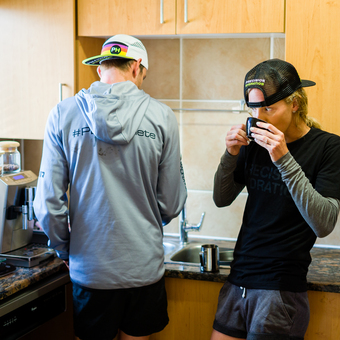Recovery these days is something that athletes simply do. In the past, recovery might have consisted of taking a day off from training, but it's now something that's actively undertaken.
In today’s day and age, there’s a recovery tool for every aspect of recovery - all delivered with guarantees of decreasing muscle soreness, aiding repair and facilitating a quicker bounce-back.
But we're taking a step back from the recovery gadgets and gizmos for this blog and focusing on the ‘core’ recovery practices of eating, drinking and sleeping.
Nutrition
Exercise depletes our muscles' glycogen stores (which is an important 'fuel reserve' for exercise) and it's well-established that consuming carbohydrates post-exercise plays an important role in replenishing these stores.
In the 1980s, Sports Scientist, John Ivy, proposed the idea that glycogen replacement could be enhanced by rapid post-exercise fuelling.
At the time, the importance of recovery was known but the role of nutrition in the process had not yet been properly considered.
Ivy conducted a study which indicated that the timing of post-exercise fuelling was of great importance and that taking on calories quickly after exercise doubled the rate of glycogen restoration.
As a result, the phrase ‘metabolic window of opportunity’ was coined; something which is now more commonly referred to as the ‘post-exercise anabolic window’.
In theory, Ivy's proposal made sense but this 'immediate' urgency for post-exercise fuelling for athletes has not been supported by subsequent research and the narrow ‘window’ he proposed appears to be more like a wide open space.
A meta-analysis published in 2013 showed that as long as an athlete consumed some carbohydrates after their workout, whether that was 20 minutes or even 3 to 6 hours after exercise, their glycogen stores would be similarly replenished.
In short, there was no rush.
The exception to the above is an athlete who's looking to maximise their short-term recovery.

Nutrition experts suggest that athletes competing in multiple events in a short period of time - for example, a swimmer who has heats, semis and finals taking place in a small timeframe - would benefit from fast carbohydrate and protein intake to replenish their glycogen stores as soon as possible. It's worth noting that this is because they’ll be needing that fuel soon.
The body absolutely requires calories after exercise. Consistent under-fuelling will impair your performance and recovery and may predispose you to injury. But the timing and composition of these calories perhaps isn’t as important as was made out by Ivy, who went on to publish a book in 2004 titled ‘Nutrient Timing: The Future of Sports Nutrition’.
Of course, balanced nutrition should be sought but, contrary to common belief, quite where you’re getting your calories from won’t affect your recovery (the body is less picky than you think and very good at making do).
Simply eating a regular meal containing some carbohydrates, protein and fat in good time will generally get you back to where you need to be.
(Re)hydration for recovery
During intense and prolonged exercise, you'll also lose fluids and sodium through sweating. The exact amounts vary considerably from person-to-person and will depend on the form of exercise, but replacement of both fluid and sodium is required to restore fluid balance post-exercise.
With recovery and hydration, it largely comes back to timing again.
How soon after exercise do you need to be 100% ready to perform again? If quick recovery isn’t a necessity, then it’s less important how and when you put that fluid and sodium back into your system.
When you need to restore fluid balance rapidly - perhaps you intend to perform later that day or the following day - then a more proactive approach to rehydration is warranted.
We recommend drinking 1 x PH 1500 mixed with 500ml (16oz) of water in the first few hours after exercise if you're looking to be more proactive and hoping to perform later that day or the following day.
In a review paper co-authored by highly regarded sports nutritionist, Asker Jeukendrup, it was concluded that to rehydrate effectively you need to drink 1.5 times the fluid you’ve lost, and that there must be plenty of sodium in (or alongside) that fluid to account for your sodium losses.
The reason for drinking 1.5 times more than what you’ve lost is because you'll inevitably end up peeing some of it out and to also account for your continued sweat losses (as is often the case following intense exercise).
Additionally, research shows that drinks containing sodium enable better rehydration as it allows your body to hold onto more fluid.

The inclusion of sodium prevents your blood sodium levels from dropping too low which in turn prevents the kidneys from excessively ramping up urine production, which would negate the effects of putting fluid back in!
In addition, many recovery methods - massage and compression garments to name a few - aid recovery by increasing blood flow. If recovery hinges on adequate blood flow then dehydration-induced blood-volume loss places you on the back foot and potentially impairs the speed of recovery.
Sleep
Last (but definitely not least) is the key to long-term recovery and adaptation - sleep.
Sleep is extremely powerful for recovery and, despite its importance, it's something we’re all guilty of neglecting from time to time.
It’s a fundamentally important process that is necessary for maintaining our body’s cognitive, physical, and metabolic processes, which includes immune-system function, energy balance (glucose metabolism) and hormone regulation (e.g. cortisol, testosterone, and human growth hormone - which is important for tissue repair).
How much sleep an individual needs will vary. For instance, during periods of heavy training an athlete would benefit from having a little more. The standard suggestion for adults aged between 18 and 60 is a good 8+ hours of sleep a night.
In our current society it’s common to be sleep-deprived. Everyone can think of someone who says with pride that they’re able to function just fine off of 5-6 hours of sleep. In reality, these individuals have only become accustomed to the impairments induced by lack of sleep.
It’s not all about sleep duration, it’s also the quality of sleep you’re getting. Only quality sleep instigates proper recovery. These days you’re able to purchase sleep trackers or download an app on your phone, but the easiest way of getting higher quality sleep is to make it a priority. If you’re an athlete, getting enough sleep should be as big a part of your training program as your exercise sessions.
To facilitate quality sleep, you should aim to create a dark, quiet, and cool sleeping environment, while you should also switch off electronics and screens (especially blue-light emitting screens) at least 30-minutes beforehand. Having a regular bed and waking time is also encouraged.
For more information, check out Matthew Walker's Why We Sleep, which Andy has reviewed here.
Putting these simple things into place can have big pay-offs for your sleep quality and in turn, your recovery.
Conclusion
Recovery is arguably as important as your training. So, giving proper time to recovery will go a long way to helping optimise your performance. The beauty of it though is that you don’t need to spend a lot of time or money to really nail recovery.
Too many athletes today are looking for an exact scientific formula to tell them what to eat, drink, sleep, and do. The problem with this approach is it takes us further and further away from the ‘basics’ and what actually matters - eating, drinking and sleeping well.
Getting your nutrition, hydration and sleep right will have the biggest pay-offs. Once you’ve got these down, then consider turning your attention to the gadgets and the gizmos.
